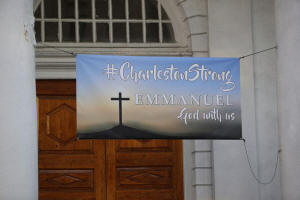|
South Carolina church gunman's two death
penalty trials a rarity
 Send a link to a friend
Send a link to a friend
 [December 17, 2016]
By Jon Herskovitz and Greg Lacour [December 17, 2016]
By Jon Herskovitz and Greg Lacour
(Reuters) - White supremacist Dylann Roof's
conviction on federal hate crimes in the Charleston church massacre sets
him up to be the first person to face back-to-back federal and state
death sentences since the United States reinstated the death penalty at
the national level in 1988.
Roof, found guilty on Thursday on all counts in the shooting deaths of
nine black parishioners at Emanuel African Methodist Episcopal Church in
South Carolina in 2015, begins the punishment phase in his federal trial
on Jan. 3.
His state trial on murder charges is expected to start about two weeks
after that, and local prosecutors also want him executed.
The dual death sentence-eligible trials are unprecedented in the modern
era of the U.S. death penalty, legal experts said on Friday, and raise
questions about judicial fairness, the emotional toll on survivors and
victims' families and potential legal problems if the two juries reach
different decisions.
The shooting where Roof had waited for members of a Bible study group to
close their eyes in prayer before opening fire sent shockwaves across
the United States. Both U.S. Attorney General Loretta Lynch and
Charleston Solicitor Scarlett Wilson wanted justice and unlike in
lower-profile cases, no deal was reached to allow only one prosecutor to
try the case.
Christopher Adams, a Charleston lawyer who is the secretary of the
National Association of Criminal Defense Lawyers, said the Roof case "is
a terrible crime that gets everyone’s attention.

"However, there has to be an adult decision made and there should only
be one trial and it should be as fair as it can be. That decision wasn’t
made," said Adams who has represented several defendants in death
penalty cases.
Outside the historic South Carolina church where the killings took
place, several people who came to pay their respects a day after the
verdicts said they wanted to see Roof stand trial again.
"I believe the death penalty in this situation is appropriate, even if
it's imposed twice," said the Reverend Paul Tanner Kennedy, 70, visiting
from his home in New Jersey. "There are certain things that require
retribution."
Roof is facing different charges in the two systems for the killings in
Charleston. South Carolina is prosecuting him for murder. The U.S.
government prosecuted him on 33 charges that included hate crimes
resulting in death.
[to top of second column] |

A Charleston Strong banner hangs from a church across from the
Charleston Federal Courthouse during the federal trial of Dylann
Roof who was found guilty of 33 counts including hate crimes in
Charleston, South Carolina December 15, 2016. REUTERS/Randall Hill

Since the reinstatement of the federal death penalty in 1988, 75
defendants have been sentenced to death and three others have
received a jury recommendation of death but no death sentence from
the judge, according to the Death Penalty Information Center, which
monitors U.S. capital punishment.
There have been three executions since then, including Oklahoma City
bomber Timothy McVeigh in 2001.
His accomplice Terry Nichols faced death penalty-eligible federal
and state trials about seven years apart for the killings. The
federal trial in 1997 was for the death of eight federal officers
while the state trial was for the death of 160 others. He was
convicted in both trials and sentenced to life in prison without
parole in both cases.
Robert Dunham, executive director of the Death Penalty Information
Center, said pursuing a second death penalty after one has been
handed out stokes criticism that politics plays a role in death
penalty prosecutions.
"It makes it appear as though it is less serving the interests of
justice and more serving the political interests of the prosecutor,"
he said.
(Reporting by Jon Herskovitz in Austin, Texas and Greg Lacour in
Charleston, South Carolina; Editing by Lisa Shumaker)
[© 2016 Thomson Reuters. All rights
reserved.]
Copyright 2016 Reuters. All rights reserved. This material may not be published,
broadcast, rewritten or redistributed.
 |